The 52nd session of the Human Rights Council (27 February – 4 April 2023) was the first HRC session since the establishment of the Fact-Finding Mission, a new mandate investigating human rights violations in Iran related to the protests that began on 16 September 2022.
High Level Segment
It began with the High Level Segment (HLS), during which foreign ministers and other member state dignitaries highlighted their human rights priorities. On March 27, Iran’s own Minister of Foreign Affairs, Hossein Amir-Abdollahian, gave the first remarks by an Iranian government official at the Human Rights Council since it last convened for a Special Session on the recent protest movement, culminating in the establishment of an independent, international fact-finding mission. Mr. Amir-Abdollahian described the protests as “peaceful assemblies turned violent following the intervention of violent terrorist elements”, and also expressed that “No country can claim to be perfect in its human rights performance.” Find the minister’s full intervention below, and find more information on his remarks here.
The following day, Christian Guillermet, Vice Minister of Foreign Affairs of Costa Rica, delivered a joint statement on behalf of a cross-regional group of 54 countries, condemning the Islamic Republic’s use of the death penalty. In addition to the joint statement, 22 States condemned the Islamic Regime’s use of arbitrary detention, the death penalty and violence against protestors.
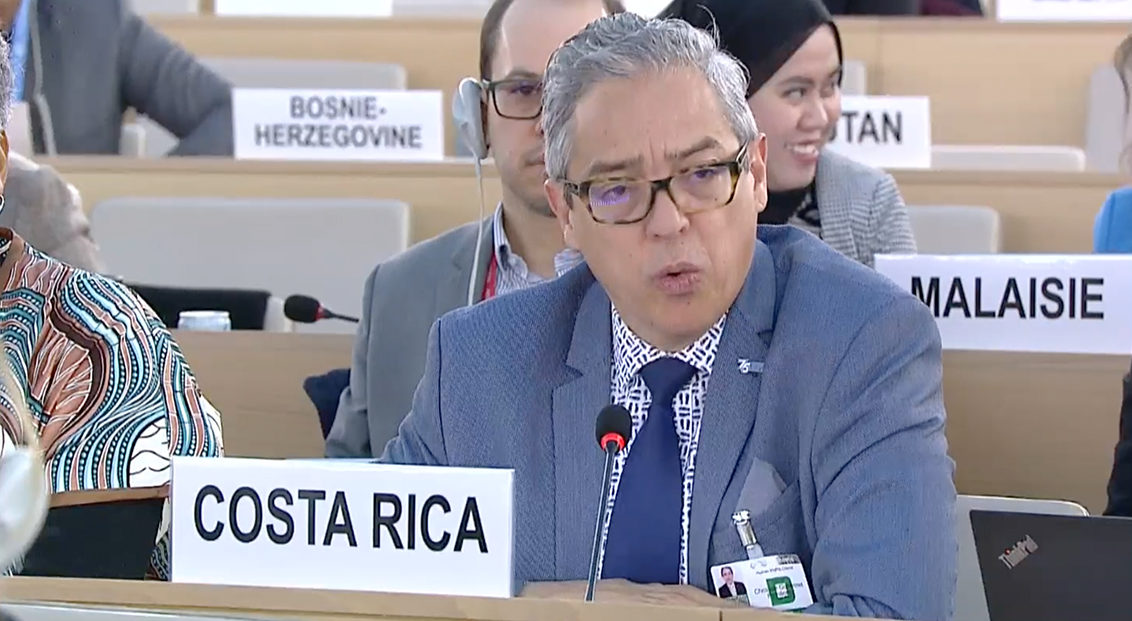
“We are deeply concerned by the use of the death penalty in Iran. Several hundred people were reportedly executed in Iran last year, including juvenile offenders.
In recent months, Iran has handed down or sought to impose death sentences against dozens of individuals arrested in connection with their participation in protests following the death in custody of Jina Mahsa Amini.“
Find the full statement and list of signatories here.
Several states used the High Level Segment to make remarks on the human rights situation in Iran:
Norway
“Listening just now to the representative from Iran, I was reminded of the importance of this forum […] It is about upholding the commitments we have made, to obligations and duties under international law to respect, protect and fulfil human rights. Norway is deeply concerned about the worsening situation for human rights in Iran. Not least the violent response to popular and peaceful demonstrations. We urge Iran to respond with meaningful reform. And to immediately stop the executions.
UK
“In Iran, the killing of Mahsa Amini last September was yet another shocking reminder of the regime’s callous disregard for the lives of its own citizens. Since October, we’ve introduced five separate sanctions packages targeting those individuals and entities responsible for serious human rights violations.
We reaffirm our commitment to support the fact finding mission established by this Council in November. We must ensure that the voice of the Iranian people continues to be heard.”
Austria
“In Iran, there have been waves of protests in recent years, demanding justice, equality and respect for human rights. These legitimate calls for human rights have been met with unnecessary and disproportionate violence and repression.”
HC Oral Update / Agenda Item 2
On March 7, Volker Türk, UN High Commissioner for Human Rights, delivered his annual report and Oral Update on the activities of his Office and recent human rights developments, which included the following remarks on the human rights situation in Iran:
“In Iran, it is urgent for the authorities to act on the demands of protestors, in particular women and girls who continue to endure profound discrimination. I remain deeply concerned about 17 protestors who have reportedly been sentenced to death. 4 have been executed so far and more than 100 currently face charges that carry the death penalty. The recently announced pardons are a welcome first step. I continue to urge the immediate and non-conditional release of all those arbitrarily detained in the context of the protests, and more generally, including foreign and dual nationals. All Iranians, including all women and girls, must be free to make their own choices, express their views and exercise their rights.”
Interactive Dialogue w/ Special Rapporteur on Iran Javaid Rehman
On March 20, Javaid Rehman, the UN Special Rapporteur on the human rights situation in the Islamic Republic of Iran, presented the first UN report on the deadly repression of the recent Iran protests to the Human Rights Council. Find the full report here, and the full broadcast (in two parts) of the interactive dialogue below, via UN Web TV:
In his opening remarks, Mr. Rehman made note of the circumstances that led to the death of Jina Mahsa Amini:
“I present to this Council available evidence including eyewitness testimonies and comments from reliable medical sources establishing that Ms. Amini died on 16 September as a result of beatings by the State morality police. As per usual practice, State authorities have characteristically denied any wrongdoing or misconduct on their part and presented the results of so-called investigations that were neither credible nor transparent and failed to meet the minimum requirements of impartiality and independence”.
The SR also underlined the scope and gravity of human rights violations committed during the ensuing protest movement:
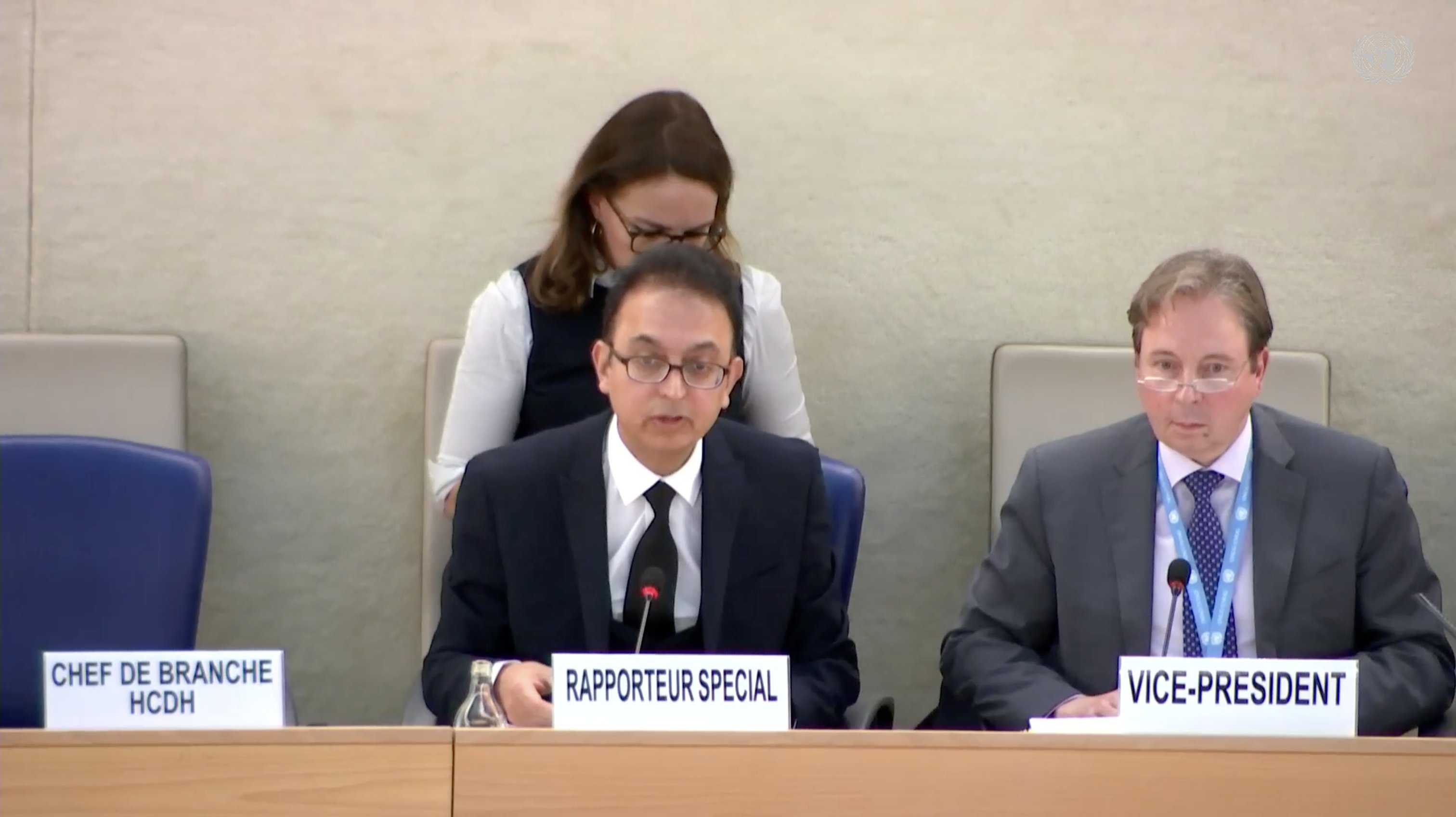
“The scale and gravity of the violations committed by Iranian authorities, especially since the death of Ms. Amini points to the possible commission of international crimes, notably the crimes against humanity of murder, imprisonment, enforced disappearances, torture, rape and sexual violence, and persecution.”
Speaking on behalf of the concerned country, The Islamic Republic’s Mr. Ali Bahreini responded to the SR’s remarks:
“Mr. Rehman, in total disregard of his duties under res. 5/2, which emphasizes the impartiality of the SRs, unfortunately plays the role of the opposition. In all his writings and statements, he uses biased language and violates code of conduct of [..] mandate holders.”
“The allegations made by Mr. Javaid Rehman in his report, which are read like a tragic novel, have been repeated by a number of Western governments and their media outlets and terrorist groups stationed in their countries in the past months. They tried to portray their imaginations as the reality of human rights situation in Iran.”
Many member states expressed concern for the deteriorating human rights situation, while several states drew attention to the possibility of the commission of international crimes:
Belgium
“We support the Special Rapporteur’s call for accountability with respect to the grave human rights violations and possible crimes under international law committed by Iran.”
Montenegro
“In breach of its international obligations ensuring the rights to life, liberty and security of person, the authorities have proceeded to widespread patterns of denial and cover-up of the responsibility for serious crimes under international law.”
Argentina
“We are also alarmed that the Rapporteur concludes that “the magnitude and gravity of these violations indicate the possible commission of international crimes, in particular the crimes against humanity of murder, imprisonment, enforced disappearances, torture, rape and sexual violence, and persecution.”
The dialogue also included interventions from human rights institutions and NGOs, during which Mahsa Alimardani took the floor on behalf of coalition member Article 19:
“We ask this council to stand with the people of Iran, to vote on this session’s substantive resolution, and to renew the mandate of the Special Rapporteur on Iran. The path to hope starts with justice and accountability with which this council can vote on.”
Find a more detailed recap of the Interactive Dialogue here.
HRC52 Side Events
Several side events dovetailed the Special Rapporteur’s Interactive Dialogue, and brought attention to the human rights situation in Iran by featuring perspectives from civil society members, activists, and human rights experts such as Special Rapporteur Rehman. These included:
Death Penalty in Iran (Organized by ECPM, Iran Human Rights & Impact Iran)
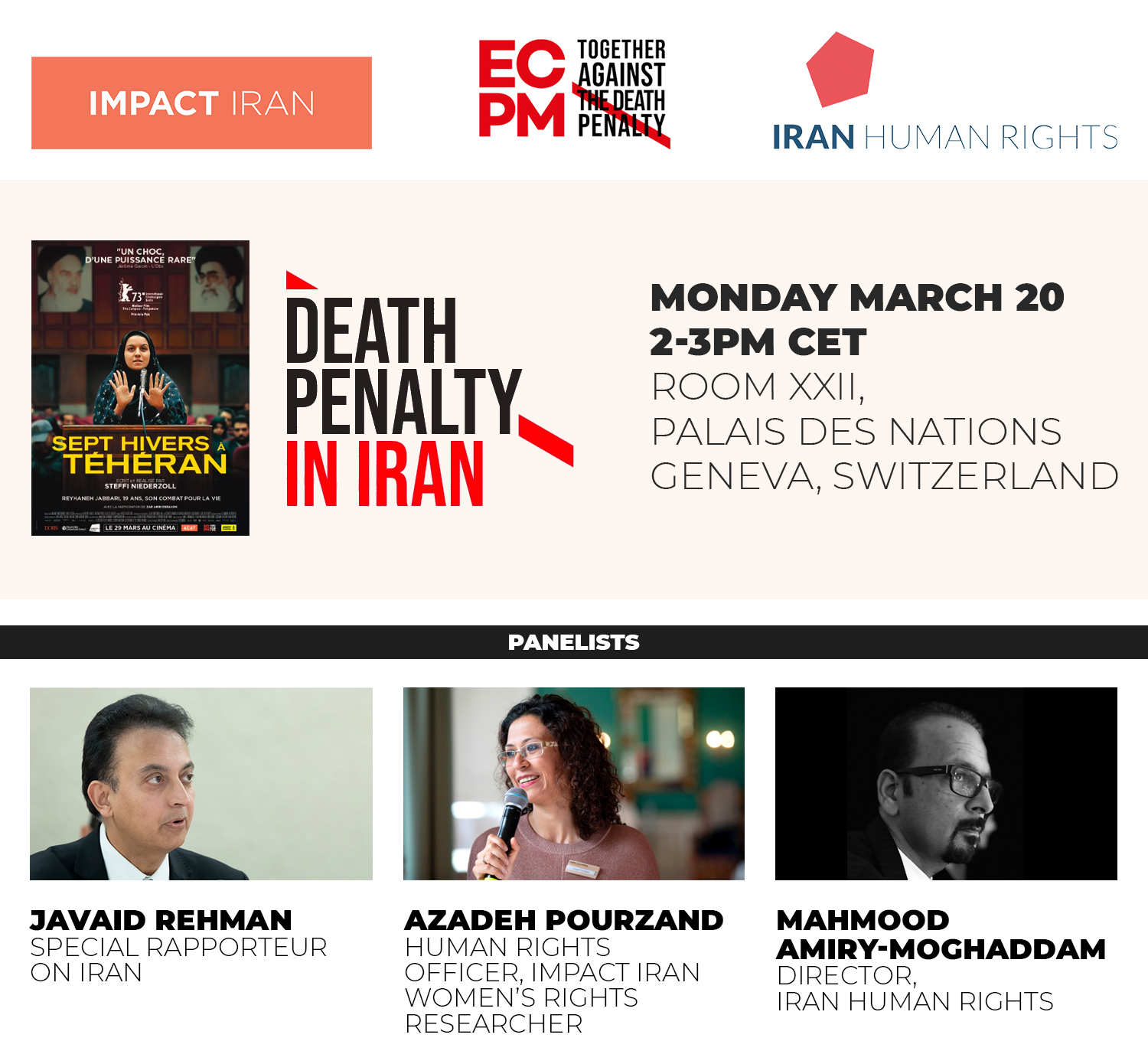
Per ECPM: “On 20 March, ECPM and several of its partners were at the Palais des Nations in Geneva for the Interactive Dialogue with the Special Rapporteur on the situation of human rights in Iran. ECPM co-signed two oral interventions on the death penalty in Iran, one with Iran Human Rights and the second with Harm Reduction International and other NGOs. ECPM also organised and co-sponsored two side events in the margins of the Dialogue.” The event also featured excerpts from Steffi Niederzoll’s 2023 documentary Seven Winters in Tehran.
Below are extracts from the three panelists’ remarks:
Mr. Mahmood Amiry-Moghaddam, (Director, Iran Human Rights)
“In 2018, Iran changed its criminal law, which led to the most significant decline in the number of executions seen in modern times. Yet Iran remains one of the biggest executioner for drug-related offenses. Since 2021 we have seen a gradual rise in the number of drug-related executions again from 25 in 2020, to 126 in 2021, to 256 in 2022. […] These executions remain invisible at the international stage. If the situation continues, 2023 may be one of the worst years of drug-related executions in Iran.
Around 44% of all people we surveyed in Iran are completely against the death penalty regardless of crimes, while 26 % are against the death penalty imposed for offenses that do not amount to most serious crimes.”
Ms. Azadeh Pourzand (Human Rights Officer at Impact Iran)
“The Islamic Republic is one of the biggest executioners of women in the world. The uprising that began with the death in custody of Jina Mahsa Amini really made it to the international stage by way of the slogan, a Kurdish slogan, “Women, Life, Freedom.” Life is really at the heart of what we are speaking about today, what life really means for women in Iran, living an ordinary life in peace and going through all stages of life, childhood, adolescence, education, getting married and having children, having a job, and so on. The Islamic Republic is structurally against women’s advancement and women being able to enjoy their lives at its fullest. Many people across the world saw the protests across Iran led by women and the marginalized parts of Iran’s society and at first glance they thought it was about exclusively about the practice of the compulsory veil but I think those of us who have lived their experience in the Islamic Republic understood it was a symbol of much wider systematic and systemic discrimination against women.
In Iran, according to the law, a girl can be married at the age of 13, but that age can be further decreased with the consent of the family. She doesn’t have the right to divorce de facto, she faces legalized domestic violence. She has no support or access from the convoluted and complicated legal system. And before she knows it, she’s on death row, for crimes she allegedly committed as a juvenile.”
Javaid Rehman (UN Special Rapporteur on Iran)
“As I said on many occasions, I regard all executions in Iran as arbitrary deprivations of life. Arbitrary because Iran’s legal framework has over 80 sentences that carry the death penalty, because the Islamic Republic executes juvenile offenders, because it executes in high numbers, and because it is the biggest executioner of women in the world. There are also issues in terms of the disproportionate nature of executions of members of minorities, the absence of accountability, and impunity for various crimes, including honor killings. There is the issue of discrimination under criminal law, with girls’ age of criminal liability standing at 9 lunar years. There is a whole umbrella of violations of human rights making executions an Islamic Republic’s tool that takes lives and instills fear in Iran.”
PROTESTS IN IRAN: Where do we stand six months in?
Hosted by Article 19 with Front Line Defenders, IHRDC, Impact Iran, Amnesty International, and ECPM
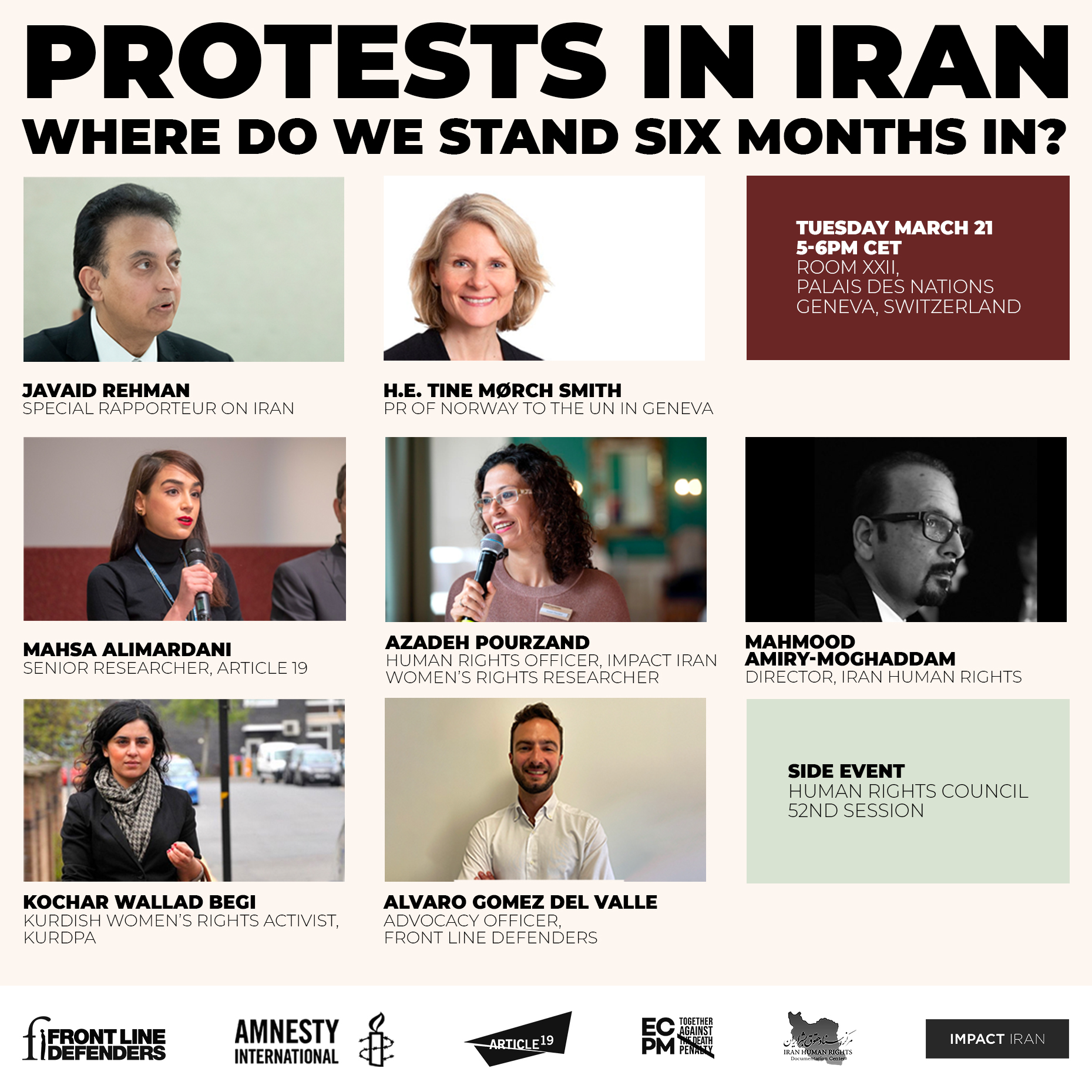
Find extracts from panelist remarks below:
Javaid Rehman (Special Rapporteur on Iran)
“All laws that discriminate against women and girls and violate their dignity must be immediately repealed. There can be no excuse for any people to continue violating the dignity of others, including women, for whatever justification. In my report, I found serious evidence, including evidence of murder, enforced disappearances, torture, and sexual violence, as part of a systematic, widespread, and state-instigated policy. The scale of these crimes points to the possible commission of crimes against humanity.“

Ms. Azadeh Pourzand (Impact Iran)
“On many occasions, we hear the Islamic Republic speaking of the accomplishments of women in today’s Iran. But it is important to say that any positive developments in women’s rights in Iran were only made possible thanks to the leadership, courage, resilience, and peaceful resistance that women have shown for the past decades. They don’t owe it in any way to the authorities. Women’s leadership and activism the international community is seeing since September 2022, in fact, has been going on for decades and has been incredibly costly for women in Iran.“
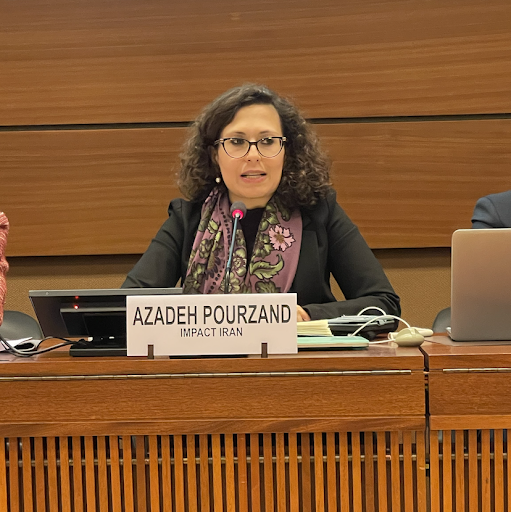
Kocher Wallad Begi (KURDPA)
“Kurds and other ethnic minorities in Iran are being systematically oppressed on daily bases and have been for decades and not only for the past 6 months; Being Kurdish, and Baluchi in Iran is equivalent to being a criminal; ´Advocating for the rights of own identify, own language, political and economic rights can get any Kurd and Baluch ´arrested, detained, tortured and executed.“

Mahsa Alimardani (Article 19)
“One thing that we have depended on to monitor Iran’s human rights situation is access to the internet. However, it has been extremely cumbersome and difficult because authorities’ internet shutdowns aggressively increased since the murder of Jina Mahsa Amini and has facilitated and concealed crimes perpetrated by the Iranian authorities. Thus, all efforts to establish unrestricted internet must continue, and international pressure against authorities’ attempts to disrupt internet access (e.g. User Protection Bill) must increase.”

OTHERS IN THEIR OWN LAND: The Bahá’ís in Iran
Hosted by the Bahá’í International Community
This HRC Side Event featured excerpts from Farid Haerinejad’s 2022 film Others in Their Own Land: The Institutionalized Persecution of the Baha’is in Iran, and a panel discussion which included Impact Iran’s Glenn Payot, who highlighted the need for human rights stakeholders and the international community to be more explicit in naming communities of ethnic or religious minorities whose rights are violated, and underscored how discrimination and stigma can exist both at the socio-cultural level and the institutional level, citing a 1991 memorandum signed by Khameini as evidence of the latter.
Draft Resolution Vote

Iceland presented Draft Resolution Res.A/HRC/52/L3 on behalf of a core group with North Macedonia, Moldova, and the U.K and Northern Ireland, which renwed the mandate of the SR, but also included new, substantial language on the human rights situation in Iran.
